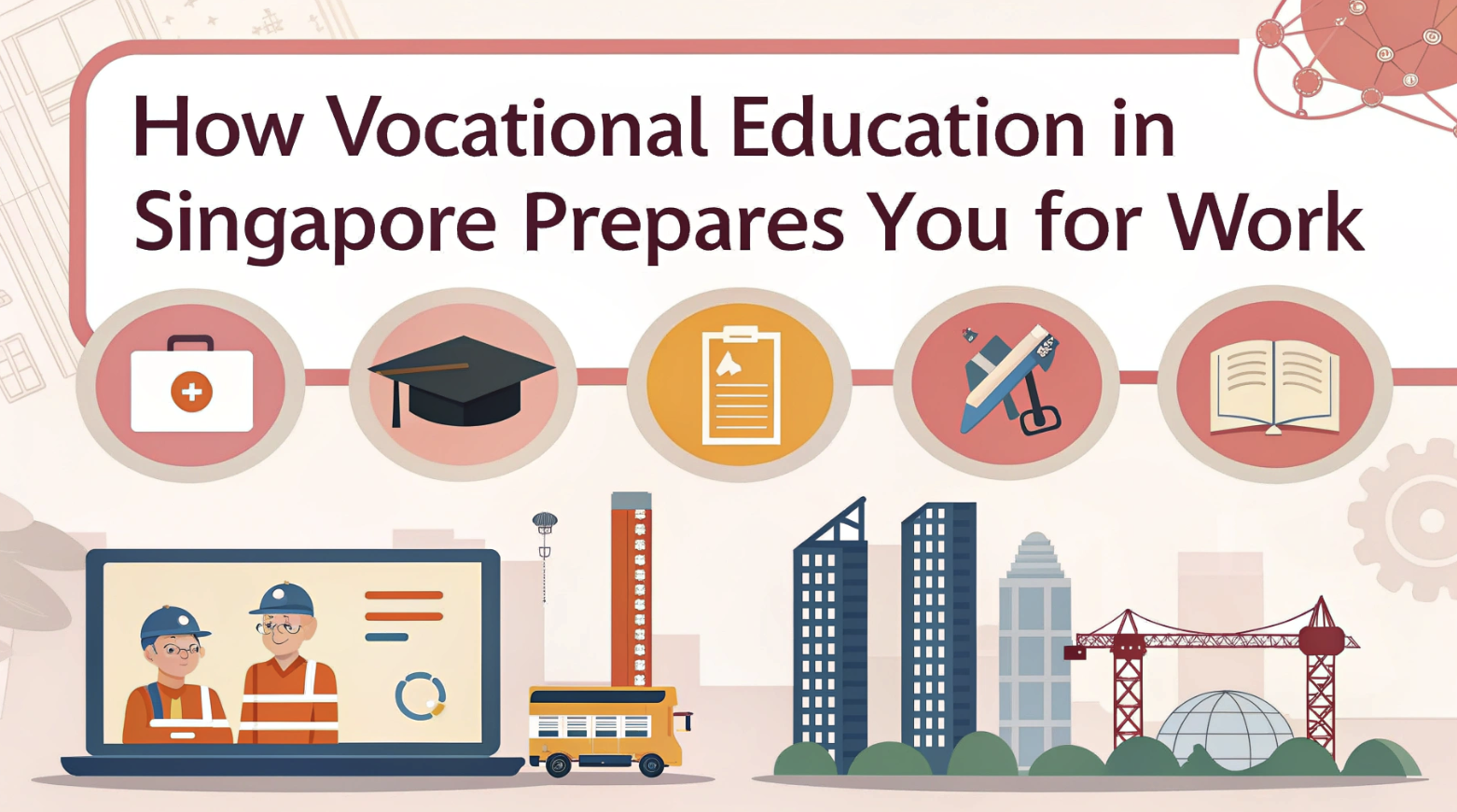
Vocational education in Singapore equips you with the skills and knowledge needed to succeed in the workforce. Nearly 90% of vocational graduates secure jobs within six months, showcasing its effectiveness in bridging the gap between education and employment. Programs like Competency-Based Education (CBE) focus on practical training, ensuring you gain job-relevant expertise. Internships and updated curricula prepare you for real-world challenges. With vocational education, you can confidently step into industries that value hands-on experience and technical proficiency.
Overview of Vocational Education in Singapore
Definition and Purpose
What is vocational education in Singapore?
Vocational education in Singapore focuses on equipping you with practical skills and knowledge that directly align with industry needs. Unlike traditional academic pathways, this system emphasizes hands-on training and real-world applications. It prepares you for specific careers by offering targeted programs that address the demands of Singapore’s workforce.
With a strong emphasis on technical and vocational education and training, this approach ensures that you gain the expertise needed to excel in your chosen field.
The role of technical and vocational education in workforce preparation
Technical and vocational education plays a crucial role in shaping Singapore’s workforce. It bridges the gap between education and employment by providing you with industry-relevant skills. For instance, nearly 90% of graduates from the Institute of Technical Education (ITE) secure jobs within six months of graduation. This high employment rate highlights the effectiveness of vocational training in preparing you for the job market.
Programs like the SkillsFuture Earn and Learn Programme offer a wage premium of about 10% above polytechnic diploma graduates, showcasing the tangible benefits of this education system.
Key Institutions and Programs
The Institute of Technical Education (ITE) and its offerings
The Institute of Technical Education (ITE) stands as a cornerstone of Singapore’s vocational education system. It offers a wide range of programs designed to meet the needs of various industries. You can pursue certifications like Nitec and Higher Nitec, which focus on practical skills development.
Starting in 2022, ITE introduced a streamlined pathway allowing students to complete both Nitec and Higher Nitec qualifications in just three years, enhancing your career readiness.
Polytechnics and their industry-focused courses
Singapore’s polytechnics provide another vital avenue for vocational pathways. These institutions offer industry-focused courses that combine theoretical knowledge with practical applications. For example, polytechnic graduates often benefit from internships and project-based learning, giving you a competitive edge in the job market.
Graduates from these programs frequently enjoy high employment rates and opportunities for career advancement.
Specialized certifications like Nitec and SkillsFuture programs
Specialized certifications such as Nitec and SkillsFuture programs further enhance your employability. The SkillsFuture initiative, supported by SkillsFuture Singapore, offers a variety of training opportunities to help you stay relevant in a rapidly evolving job market.
Programs like the SGUnited Skills Programme provide targeted training for in-demand industries, ensuring that you remain competitive. These certifications not only boost your skills but also open doors to higher wages and better career prospects.
Practical Skills Development
Hands-On Training
Real-world applications in vocational education
Vocational education in Singapore emphasizes practical learning to prepare you for real-world challenges. Through skill-based training, you gain hands-on experience that mirrors actual workplace scenarios. For example, many training programmes include projects where you solve industry-specific problems. These projects allow you to apply your skills in meaningful ways, ensuring you are ready to meet the demands of employers.
Vocational training also leads to measurable improvements in your career prospects.
A study on the Workforce Skills Qualification (WSQ) training revealed that unemployed trainees who completed their training between 2011 and 2016 had a higher success rate in finding jobs. Additionally, they earned an average of 0.8% more in the year following their training compared to those who did not participate. This highlights how practical skills development can directly impact your employability and income.
Simulated work environments and practical projects
Simulated work environments play a key role in technical and vocational education and training. These environments replicate real workplaces, allowing you to practice your skills in a controlled setting. For instance, you might work on mock production lines or use industry-standard tools to complete tasks.
This approach helps you build confidence and competence before entering the workforce.
Practical projects further enhance your learning experience. These projects often involve collaboration with peers, teaching you teamwork and problem-solving skills. By completing these tasks, you develop a deeper understanding of your chosen field and gain valuable insights into industry expectations.
Use of Technology
Integration of modern tools in technical and vocational education
Technology is a cornerstone of vocational education in Singapore. Training programmes integrate modern tools to ensure you stay ahead in a rapidly evolving job market. For example, you might learn to use advanced software, machinery, or digital platforms relevant to your industry. This exposure helps you develop technical skills that are essential for today’s technology-driven industries.
The SkillsFuture initiative also supports your skills development by offering courses that focus on emerging technologies. These courses prepare you to adapt to new tools and methods, making you a valuable asset to employers.
Preparing students for technology-driven industries
As industries in Singapore become more technology-driven, vocational education equips you with the skills needed to thrive. Training in areas like robotics, artificial intelligence, and data analytics ensures you are ready for the future of work. Graduates from the SkillsFuture Earn and Learn Programme (ELP) have experienced a sustained wage premium of approximately 10% over polytechnic diploma graduates, showcasing the value of technology-focused training.
By mastering these tools and techniques, you position yourself as a competitive candidate in industries that prioritize innovation. This preparation not only boosts your employability but also sets the stage for long-term career growth.
Industry Relevance and Partnerships
Collaboration with Industries
Industry involvement in curriculum design
Vocational education in Singapore thrives on strong partnerships with industries. These collaborations ensure that the curriculum remains relevant and practical. Industry experts actively contribute to designing an industry-relevant curriculum, aligning it with the latest trends and demands. For example, sectors like healthcare, engineering, and information technology often provide input to shape the training programs. This approach guarantees that you acquire the skills employers seek, making you a valuable addition to the workforce.
Institutions like the Institute of Technical Education (ITE) and polytechnics work closely with industry leaders to update their programs regularly. This collaboration ensures that technical and vocational education and training stays ahead of the curve.
As a result, you gain access to cutting-edge tools and techniques, preparing you for real-world challenges.
Ensuring alignment with Singapore’s market demands
Singapore’s economy evolves rapidly, and vocational training adapts to meet these changes. Training programs focus on sectors experiencing growth, such as advanced manufacturing, digital services, and green technologies. This alignment ensures that your skills remain in demand, increasing your employability.
The SkillsFuture initiative plays a key role in this process. It identifies emerging industries and provides targeted training opportunities.
For instance, courses in data analytics and artificial intelligence equip you with future-ready skills. This proactive approach ensures that vocational education in Singapore remains a cornerstone of workforce development.
Internship and Apprenticeship Opportunities
Benefits of internships for real-world experience
Internships form an integral part of vocational education. They allow you to apply your classroom knowledge in real-world settings. During an internship, you gain hands-on experience, develop problem-solving skills, and build confidence. Employers value this practical exposure, which often leads to job offers upon graduation.
Internships also help you understand workplace dynamics. You learn how to collaborate with colleagues, meet deadlines, and adapt to professional environments. These experiences enhance your skills development and prepare you for a seamless transition into the workforce.
Apprenticeships as a pathway to skill-building and networking
Apprenticeships offer another valuable pathway for vocational training. They combine on-the-job training with mentorship, allowing you to learn directly from industry professionals. This approach helps you master technical skills while gaining insights into industry practices.
In Singapore, apprenticeships often lead to long-term career opportunities. They provide a platform for networking, enabling you to build connections with potential employers. Programs like the SkillsFuture Earn and Learn Programme further enhance your prospects by offering structured training and competitive wages. These opportunities ensure that you not only gain expertise but also establish a strong foundation for career growth.
Career Readiness and Opportunities
Job Placement and Success Stories
High employment rates for vocational education graduates
Vocational education in Singapore ensures you are well-prepared for the workforce. Graduates from technical and vocational education and training programs consistently achieve high employment rates. For example, over 90% of graduates from the Institute of Technical Education (ITE) secure jobs within six months. This success reflects the strong alignment between vocational training and industry needs. Employers value the practical skills you gain, making you a competitive candidate in the job market.
Examples of successful alumni in Singapore’s industries
Many alumni from vocational education programs have excelled in their careers. For instance, graduates from SkillsFuture Singapore initiatives have advanced into leadership roles in industries like healthcare, engineering, and technology. One notable example includes a former ITE student who became a senior technician in a multinational corporation. These success stories highlight how vocational training can transform your career prospects and open doors to long-term opportunities.
Pathways for Further Growth
Opportunities for further education through SkillsFuture
SkillsFuture offers you a wide range of opportunities to continue your education and enhance your skills. Through the Skills Framework, you can identify career pathways and access training programs tailored to your goals.
For example, the SkillsFuture Credit allows you to enroll in courses that align with emerging industry trends. These programs help you stay relevant in a rapidly changing job market.
Career progression and long-term benefits of vocational training
Vocational training provides a solid foundation for career growth. The hands-on experience and industry-relevant skills you acquire make you a valuable asset to employers. Over time, you can progress into higher roles or even pursue further education. Many vocational graduates use SkillsFuture initiatives to specialize in advanced fields, ensuring continuous skills development. This approach not only boosts your employability but also secures your place in Singapore’s evolving workforce.
Vocational education in Singapore equips you with the essential skills to thrive in today’s competitive job market. It bridges the gap between learning and employment, ensuring you are ready to excel in your chosen field. Through hands-on training, industry partnerships, and career-focused opportunities, you gain practical expertise that aligns with market demands. This system not only prepares you for immediate employment but also sets the foundation for long-term growth.
With vocational education, you can confidently pursue a future where your skills remain relevant and valued.
FAQ
What makes vocational education different from traditional academic pathways?
Vocational education focuses on practical training and industry-specific skills. Unlike traditional academic routes, it prepares you for specific careers through hands-on learning and real-world applications. This approach ensures you gain the expertise needed to meet employer expectations and excel in your chosen field.
Can vocational education help you adapt to changing industries?
Yes, vocational education equips you with adaptable skills for evolving industries. Programs often integrate emerging technologies like robotics and data analytics. This ensures you stay relevant in technology-driven sectors and remain competitive in Singapore’s dynamic job market.
Are internships mandatory in vocational education programs?
Most vocational education programs include internships as a core component. These opportunities allow you to apply your skills in real-world settings, gain valuable experience, and build professional networks. Internships also enhance your employability by preparing you for workplace challenges.
How does vocational education support long-term career growth?
Vocational education provides a strong foundation for career progression. The practical skills you acquire make you a valuable asset to employers. Additionally, initiatives like SkillsFuture offer continuous learning opportunities, enabling you to specialize in advanced fields and achieve long-term success.
Is vocational education suitable for technology-focused careers?
Absolutely. Vocational education integrates modern tools and technologies into its curriculum. You learn industry-relevant skills that prepare you for roles in sectors like artificial intelligence, digital services, and advanced manufacturing. This training ensures you are ready for technology-driven careers.
